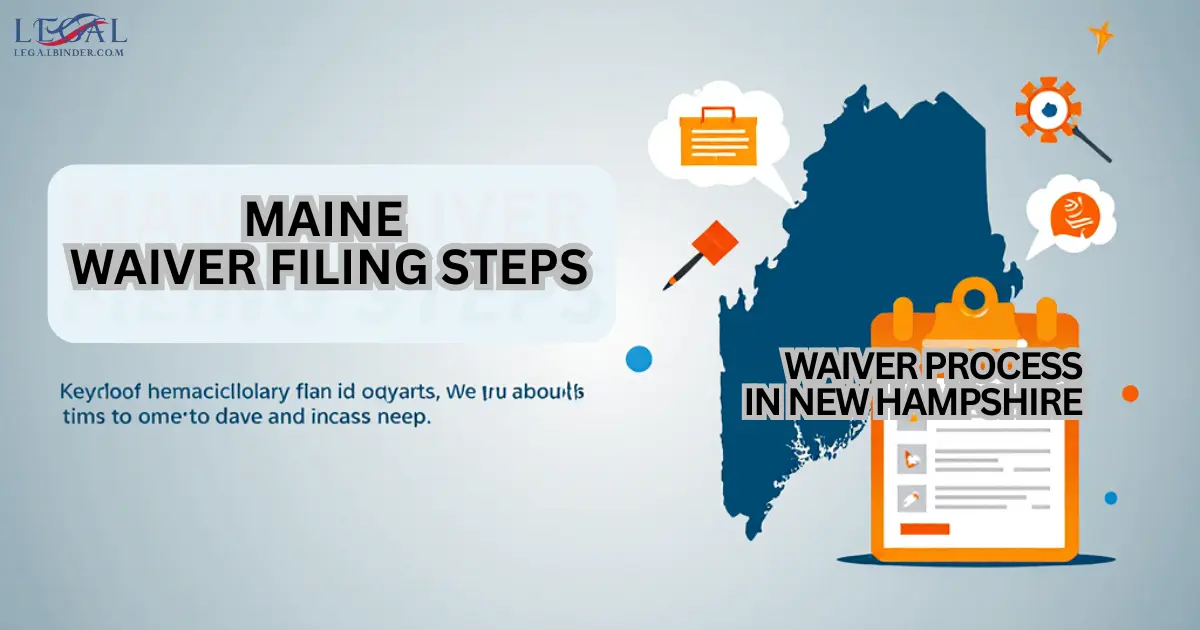This waiver Maine filing guide gives a practical, state-specific roadmap to complete and submit fee waiver requests in Maine courts in 2025. If court fees, transcript charges, or appeal filing costs present a financial barrier, follow the steps below to prepare a clear, documented waiver packet for Maine clerks or judges.
The guidance below is tailored to Maine procedures — it references Maine Judicial Branch forms, benefit verification through Maine DHHS, and local court filing practices so you can file correctly the first time. For related legal processes, see our Maine affidavit guide on USALegalBinder.com.
Quick overview — what this Waiver Maine Filing covers
A waiver in Maine commonly refers to an indigency affidavit or an in forma pauperis request that asks the court to waive prepayment of fees. Typical waivers in Maine cover:
- Filing fees for civil actions and family court matters.
- Appeal and appellate transcript fees.
- Costs for certified copies or record requests needed for a case.
Maine judges decide waiver applications by reviewing whether the applicant’s income and assets make payment an undue hardship. The court may require supporting documents before granting relief.
State-specific requirements — waiver Maine filing details
Maine expects clear, documented claims of financial inability. Key state-specific elements to include are:
- A completed Maine Judicial Branch form for an affidavit of indigency or an in forma pauperis motion (download from the court website).
- Evidence of public benefits (MaineCare, SNAP, TANF) or employer pay stubs showing income.
- Bank statements, rent/mortgage receipts, and utility bills to confirm monthly obligations.
- If incarcerated, trust account statements and the facility’s verification of balance.
Recommended Maine authority links:
Step-by-step: how to complete & submit a Waiver Maine Filing
Follow these numbered steps to prepare a complete waiver packet for filing in Maine courts.
- Confirm the correct form. Start at the Maine Judicial Branch forms page and download the current affidavit or motion used by the court level handling your matter. Using the wrong form can delay review.
- Fill out the affidavit completely. Provide full details for income, household members, assets, and monthly expenses. Be honest — false statements can lead to penalties.
- Attach documentary proof. Include recent pay stubs, DHHS award letters, bank statements (last 1–3 months), and bills that show fixed expenses.
- Prepare a cover page and index. Add a one-page cover listing attached documents so the clerk and judge can review quickly.
- Sign and notarize if needed. Verify whether the local clerk accepts in-person sworn statements or requires notarization, and comply accordingly.
- File with the right clerk. Submit to the county clerk for Superior or District Court, family court clerk for family matters, or the appellate clerk for appeals. Use e-filing where available and permitted.
- Request a filed-stamped copy and track the docket. Keep proof of filing and check the court docket for any hearing date or judge’s order.
- If denied, act quickly. A denial typically requires payment of the fee to proceed. If you cannot pay, seek immediate legal aid assistance or ask the court whether a reconsideration or limited hearing is possible.
Required documents & common Maine form names
Most Maine waiver filings will require:
- Affidavit of Indigency / Motion to Proceed In Forma Pauperis (Maine Judicial Branch form).
- Benefit verification (MaineCare, SNAP, SSDI/SSI award letters).
- Recent pay stubs or employer income verification.
- Bank statements and proof of monthly housing and utility expenses.
- Trust account statements if the applicant is detained or incarcerated.
Processing time, fees and practical deadlines
There is no fee to submit a waiver application itself. Timelines and rules:
- Decision time: Courts usually rule within days to a few weeks, depending on urgency and caseload.
- If denial occurs: You must pay the required fee to continue. For appeals, missing payment deadlines can forfeit the appeal — file the waiver as early as possible to avoid deadline issues.
- Expedited matters: Domestic violence, protection orders, and emergency family matters may be fast-tracked.
Common mistakes to avoid Waiver Maine Filing
- Submitting incomplete or inconsistent income figures — double-check all numbers.
- Failing to attach documentary proof — unsupported claims are often denied.
- Using non-Maine or outdated forms — always download current forms from courts.maine.gov.
- Missing appellate timing rules — appeals often have strict filing windows; plan ahead.
Where to find official forms (Waiver Maine Filing)
Use these authoritative resources for forms and official guidance:
FAQs
Q: Does receiving MaineCare automatically qualify me for a waiver?
A: Receiving MaineCare is strong evidence of indigency but not an automatic grant. The court will consider all financial information.
Q: Can I file a waiver if I’m incarcerated in Maine?
A: Yes. Incarcerated individuals may file in forma pauperis applications and should attach the facility trust account statement.
Q: What if my waiver is denied and I cannot pay?
A: Contact Maine Legal Aid or a local law clinic immediately. Some courts may allow a limited hearing or installment arrangements depending on circumstances.
Q: Are waiver procedures different in family court?
A: The affidavit process is similar, but family matters involving safety or child welfare may receive priority handling.
Q: Where can I get help filling out Maine forms?
A: County clerks can explain procedural filing requirements; legal aid organizations and university law clinics can provide form-filling assistance. Also see our Maine legal aid resources guide for support options.
Conclusion & call to action
Preparing a successful waiver Maine filing depends on accurate forms, clear documentation, and timely submission. Download the current affidavit from the Maine Judicial Branch, attach benefit letters and financial records, include a cover index, and file with the correct clerk. Keep a filed-stamped copy and monitor the docket.
For official forms and updates visit Maine Judicial Branch, verify benefits at Maine DHHS, and consult a licensed attorney or Maine legal aid for case-specific advice. For deeper guidance, see our full library of Maine legal articles on USALegalBinder.com.
